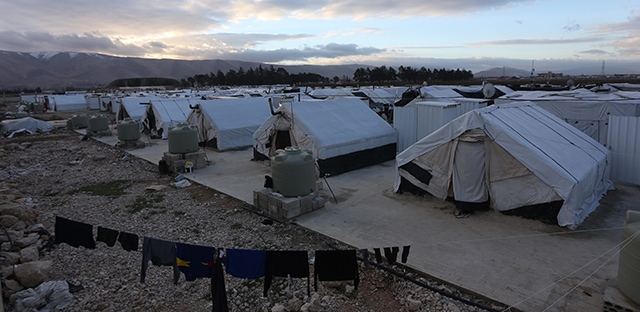The Middle East is striving to adapt to rapid economic and social change—with some success.

Across the Middle East, where more than half of the population is under the age of 24, educational systems are strained and unemployment rates are high. Even in the oil-rich Gulf, fiscal pressures from lower hydrocarbon revenues are forcing governments to cut back on the largesse their citizens have come to expect.
Meanwhile, US policies toward the region are changing and uncertain. The decline in US reliance on Middle East energy sources, due to the rise of domestic shale oil production, has led some to question America’s long-term commitment to the Middle East. Still, there are other areas where the US and its companies can become more deeply involved in the region than ever before. These areas are primarily related to new technologies, such as fintech, biotech and artificial intelligence.
As countries in the Middle East seek to diversify their economies, technology is one area that is getting a lot of attention as a new knowledge-based economy evolves. “A sophisticated digital infrastructure is integral to today’s advanced industrial activities,” Saudi Arabia’s Crown Prince Mohammed bin Salman said in 2016, in announcing the kingdom’s ambitious Vision 2030 reform program. “It attracts investors and enhances the fundamental competitiveness of the Saudi economy.”
In this supplement, we take an in-depth look at how countries throughout the Middle East are stepping into the digital economy. Surprisingly, the UAE accounts for 70% of the investments in areas such as digital banking services, cryptocurrencies, ecommerce and fintech start-up deals. For a nascent market, the growth rate is explosive, with dozens of new start-ups launching every year. So far, online payments, remittances, crowdfunding and peer-to-peer lending have attracted the largest investments. Late last year, Bahrain introduced the world’s first shariah-compliant fintech consortium.
A 5G-enabled digital boom across the Gulf is expected to generate $28 billion in revenues by 2023, as mobile-data traffic soars, according to Ericsson. Amazon is building data centers in Bahrain and Google is boosting its Arab language content. Saudi Arabia’s state-owned oil company, Aramco, is negotiating with Google parent Alphabet to build a joint-venture technology hub in the kingdom.

Young and Growing
A young and growing population with digital skills is expected to drive rapid growth in demand for broadband. Total mobile traffic for the region is forecast to increase by about 49% annually through 2023. WhatsApp is the most popular social media platform in the Middle East, followed by Facebook and YouTube, according to a survey by Northwestern University in Qatar. Five countries in the region have more smartphone use as a percentage of the population than the US. Nearly all citizens in Lebanon, Qatar, Saudi Arabia and the UAE own a smartphone, and nearly as many Jordanians, the study found. In comparison, only 77% of Americans own a smartphone, although nearly everyone owns a cellphone of some kind.
As we report elsewhere in this supplement, economic diversification strategies have paved the way for major infrastructure projects throughout the Middle East. The major construction markets in the region are Saudi Arabia, Qatar, the UAE and Egypt. With increased industrialization, Saudi Arabia is expected to continue to be the Middle East’s largest construction market. Several other markets are seeing continued significant activity due to specific events, such as Dubai’s Expo 2020 and Qatar’s hosting of the FIFA World Cup of soccer in 2022. Construction activity in other countries, such as Kuwait and Oman, is also significant, while the Iraqi market is continuing to grow from a low base.
Real estate remains important to the region, but the sector has been under pressure in terms of prices in many of the region’s markets, including the UAE, Qatar and Saudi Arabia. Nonetheless, demand for housing remains strong, particularly in Saudi Arabia. Although 47% of Saudi families already own their own homes, the Vision 2030 program aims to increase that rate by five percentage points by 2020.
New legislation and government reforms also highlight the hospitality sector as one of the drivers of growth. Many new hotels are planned for the kingdom, and a number of them will open this year.
Egypt is expected to be the fastest-growing economy in the region in 2018. The most populous country in the Arab world, Egypt has benefited from some sound policy decisions, including the floating of the Egyptian pound and support for small and medium enterprises (SMEs). The economy could receive a further boost and alleviate electricity blackouts from rising natural gas production, with the inauguration of the Zohr natural gas field in early February. Egypt is set to be a net gas exporter this year for the first time since 2014, helping to overcome its current account deficit.
Meanwhile, Qatar’s economy has proven resilient in the face of the blockade imposed by four Arab countries on June 5, 2017. As a result of the blockade, Qatar has become more independent and economically diversified. The country has launched a new dairy industry and has seen significant growth in SMEs across a range of sectors, from manufacturing and food to education and health. New sectors are emerging to support self-sufficiency, such as transport and logistics.
In the Levant, companies in Lebanon are already gearing up for participation in the rebuilding of Syria, as the war in that country appears to be moving closer to an end. The Port of Tripoli in northern Lebanon has tripled its capacity to handle containerships and expects to become a major hub between Syria and the rest of the world. Meanwhile, none of the Lebanese banks has withdrawn completely from Syria, although they have curbed their operations. They stand ready to restore their Syrian presence as conditions warrant.
Lebanon’s own economy is plagued by the third-highest debt-to-GDP ratio in the world and one of the highest levels of corruption. A major donor conference in Paris in April could help to offset the cost of hosting more than 1 million Syrian refugees and provide about $16 billion for infrastructure projects.
The upcoming May parliamentary elections, the first in nine years in Lebanon, might bring some newcomers to government with ideas for addressing the country’s economic problems. McKinsey & Company was hired in January to conduct a six-month study that will identify potential growth sectors and suggest a reform plan.
So far, the country’s financial sector has proved strong and remains the backbone of the economy. However, the IMF warns that country’s debt is unsustainable and cites the urgent need for a front-loaded fiscal consolidation plan.
In terms of social change, some of the biggest developments in the region are happening in ultraconservative Saudi Arabia, where women are gaining new rights. Beginning on June 24, when the ban on female drivers is lifted, more women are expected to enter the workforce, which could have a significant impact on Saudi GDP growth. Among the remaining hurdles to female employment and empowerment is the Saudi system of male guardianship, whereby women require their husband’s consent to travel abroad, make legal claims or obtain financing. However, cracks are appearing in the system, and women are now able to found a businesses without a male guardian’s consent.
Glass ceilings already have been smashed in the financial-services industry. Early last year, Rania Nashar was named chief executive of Samba Financial Group, becoming the first female CEO of a listed commercial bank in Saudi Arabia. Sarah Al-Suhaimi became the first female chair of Saudi Arabia’s stock exchange, the Tadawul, the largest exchange in the Middle East. She remains CEO of the investment-banking unit of National Commercial Bank, NCB Capital. Saudi women have also risen to prominence in many other fields, including law and medicine.
The kingdom’s reform efforts remain on track, and the entire region is coming to grips with the new realities of fiscal constraints and the need to embrace technological innovation and social change in a post-oil world that is drawing ever nearer.



